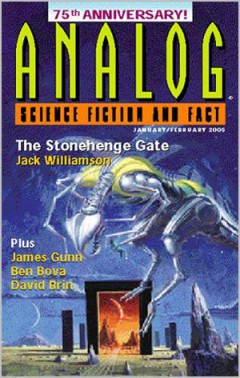
If you’ve ever wanted a peek inside the mindset of the utilitarian pragmatist and unabashedly statist, then you would do well to read or listen to David Brin’s novelette “Mars Opposition.” Begun in 2003 with the launch of the Mars Exploration Rover Mission (MER), and originally published in Analog in January 2005, “Mars Opposition” has been republished in audio format in episode 298 of StarShipSofa (free). It is a well-written tale, though predictable and unsubtle, and is superbly narrated by Dave Robison. Unfortunately, Brin uses the story as a vehicle for riding some of his political hobbyhorses:
- defending government and its officials from antigovernment criticism,
- making government smarter with the help of the technocratic elite (such as himself),
- and smearing libertarians as dogmatic, asocial creatures who are clueless about the human condition.
Fair warning, what follows is spoiler-ridden.
“Mars Opposition” opens at Cape Canaveral with the landing of a strange spaceship. What follows is an even stranger first contact with 50-odd beings who claim to be Martians. They each bear a long list of human names and offer payment in exchange for being given the location of one person on the list. When one of these people — Bruce Murray, one of the founders of the Mars Planetary Society — happens to be present, the Martian looking for him promptly walks over and “shoots him dead.” Before long, the Martians are scattering in all directions, each hunting for the next name on their list.
Why are Martians killing these people who all happen to be space enthusiasts? The unidentified narrator (from here on referring to the POV character, not Dave Robison) eventually figures everything out and explains it to us as events unfold. As fresh and interesting as this take on a first contact story is, I won’t dwell on it and will instead turn to examining Brin’s political message.
Brin himself describes “Mars Opposition” as a creepy campfire tale. That would make the Martians the boogeymen of the story. And the Martians — the boogeymen — are, as the narrator calls them at the end, ultimate libertarians.
[continue reading…]
Help Promote Prometheus Unbound by Sharing this Post
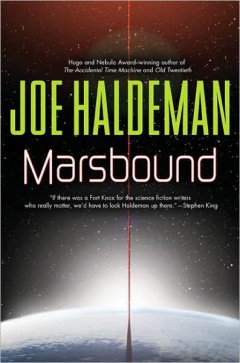

Joe Haldeman began a series with the book Marsbound. Like his other books that I have read, it starts quickly, wastes little time with descriptions, treats people mechanistically, with little emotion or soul, but tells an interesting tale. Marsbound is less entertaining than The Forever War and Forever Peace, but it is still a decent read.
The story begins on Earth, where a university student named Carmen Dula and her family are waiting for a taxi. They are on their way to Earth’s space elevator, which over the course of several days will take them up to a spaceship, which in turn will take them to Mars where they will be staying for the next five years. That is, unless something unexpected pops up.
Carmen gets on the wrong side of the bureaucratic leader of the Mars colony before she even arrives. One night, stinging from a punishment meted out to her and feeling rebellious, she goes for an unapproved walk in her Mars suit. While out, she injures herself and cannot get back. On the verge of death, she is visited by a strange creature who saves her…
[continue reading…]
Help Promote Prometheus Unbound by Sharing this Post
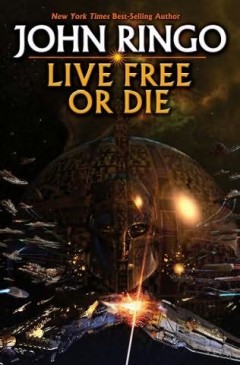

In 2010, John Ringo published the first book of the Troy Rising trilogy. Titled Live Free or Die, it is a story on a grand scale, a great symphony of a book but by an author who probably should stick to bagatelles. Though it started well and had my interest, it was a chore to get through most of it. There was enough creativity and verve for a short story, but by the end these had faded and I was glad to be finished.
It is the kind of story I imagine Ted Nugent would enjoy reading. Filled with gun-toting, rugged individuals who thrive on infuriating the Thought Police and composing odes to capitalism, the book might almost seem libertarian until one realizes just how besotted with militarism and American exceptionalism the author is. I have no problem with a man a bit rough around the edges, a touch short on couth and decorum, but Ringo at times goes beyond that into deliberate callousness, especially as regards sex and race.
There are many sensitive liberals who both need and deserve a little rattling from time to time, if only for our amusement, but there are just as many conservatives who could use a dose of circumspection, introspection, and nuance. I am tempted to suggest we lock Ringo in a room with his diametric opposites, to see if there might be a mutually beneficial rubbing off, but I am afraid someone would end up dying.
Live Free or Die begins with an alien race that establishes a portal in our solar system. They have no goals except to neutrally manage the portal, but the next race that appears is bent on imperial control of Earth. They begin by destroying some major cities and then demanding tribute. Though this species, the Horvath, is technologically backwards in comparison to other civilizations in the galaxy, they are yet far ahead of humans.
[continue reading…]
Help Promote Prometheus Unbound by Sharing this Post
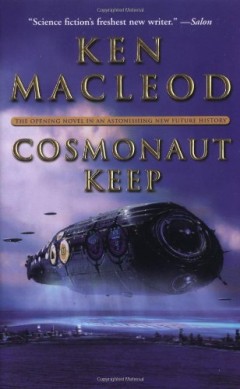
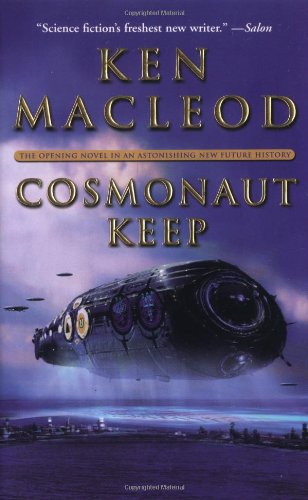
Cosmonaut Keep is the first book of the Engines of Light trilogy by Ken MacLeod, combining space opera with a unique take on the ufo mythos and a variety of leftist and libertarian political perspectives. It is told in two widely different alternating timelines, both focusing on the dream of interstellar travel.
The first timeline is set in a near-future Edinburgh, in a world where a neo–Soviet Russia has beaten back the United States and installed a kinder, gentler socialism in Europe. Matt Cairns is a computer programmer, and a member of the International Workers of the World Wide Web (or Webblies). He stumbles upon a group of American libertarians trying to overthrow the Party for fun and profit, and ends up carrying a mysterious data disk containing what appear to be plans for light-speed travel and an antigravity spaceship. Meanwhile, a rebellious European space station claims to have made first contact with aliens within an asteroid.
The second timeline is set on Mingulay, a planet in the Second Sphere, an ancient multispecies civilization. The two oldest species are the krakens and the saurs, both millions of years old. The krakens (bioluminescent and intelligent giant squid) navigate the lightspeed starships that ply the Second Sphere, while the saurs (secretive beings descended from bipedal dinosaurs who look suspiciously like the Greys of ufology) pilot gravity skiffs (read: flying saucers). In addition to two other species of hominid, there are also humans descended from those abducted from Earth by the saurs and taken to the Second Sphere over the millenia. Above all are the gods, superintelligent communities of extremophile bacteria who live in comets and asteroids, whose one and only commandment is “Leave us alone!” In this timeline, we follow Gregor Cairns — a member of the Cosmonaut Families, the descendents of the crew of a human-piloted starship from Earth — whose family has been working secretly on an interstellar navigation problem for two hundred years.
[continue reading…]
Help Promote Prometheus Unbound by Sharing this Post













